Composting is returning biodegradable material to the earth. It’s most common to compost food and veg scraps, tea bags and garden waste. But what about other products you may use in everyday life?
Have you considered if pads, panty liners and tampons can be composted too?
Picture this, a person uses up to 17,000 pads in their lifetime. Can you imagine all that waste stacked up in one big pile?
Conventional pads and panty liners are made from up to 90% crude oil plastics and therefore are not compostable or biodegradable. In fact, composting them would be the equivalent of burying a handful of plastic bags in the ground; pointless and damaging to the environment! However, that big waste footprint is not something you have to accept!
If you use menstrual products that’re plastic-free (like Natracare) and made from natural biodegradable materials such as organic cotton and plant cellulose, then yes! – you can compost pads and tampons! Natracare’s menstrual pads and most panty liners are certified commercially compostable to EN 13432 and ASTM D6400, which means when disposed of correctly, they can turn into valuable soil.
Compost your period products!
With our line of biodegradable and compostable pads and tampons.
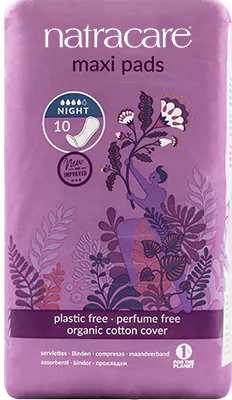
Make the switch today
How should you compost natural pads and tampons?
- Firstly, ensure you are using either certified compostable pads or 100% cotton tampons for your time of the month. These should be made from only natural, plant based materials. To find out if they’re suitable, read the ingredients list on the pack and check for validated claims or certifications for compostability (e.g. Seedling Mark, EN 13432 or ASTM D6400). If there isn’t an ingredients list, the product probably isn’t compostable. You can always get in touch with the manufacturer to check!
- Create the correct conditions for compost (i.e. damp and warm) by making a well-sealed bin and adding to it regularly. Using a properly enclosed bin is also really important to avoid attracting vermin.
- Ensure your compost has a good balance of green and brown compost
- Green compost includes veggie peelings and grass cuttings etc. – softer, damper stuff that breaks down relatively quickly.
- Brown compost involves fibrous things like cardboard and pruning clippings and natural pads and tampons which take longer to biodegrade than ‘green’ compost.
- To speed up the composting process, it’s a good idea to break up the pads and liners by hand (or with scissors) before putting them in the compost bin. Ideally, separate the backing layer which holds a small amount of adhesive – this can be composted too.
- Pat yourself on the back for choosing monthly products that won’t contribute to landfill!
Most Natracare pads and panty liners are certified commercially compostable to EN 13432 and ASTM D6400, we have enough testing data to know it’s possible to compost them safely in a domestic compost bin as well, though it takes a little longer. We have a hot composting bin at our headquarters where we compost Natracare products. If using a cold compost bin, we recommend waiting 18–24 months for a more thorough breakdown of period products in a home compost bin. Keep adding only compostable waste to your bin, then ensure it stays warm, moist and well aired. This lets it break down beneficially into the building blocks of soil to better fuel future plant growth. We have more information on the details of composting pads and tampons below:
How Long Do Pads Take to Compost?
How Long Do Tampons Take to Compost?
Check out our compostable period products too!
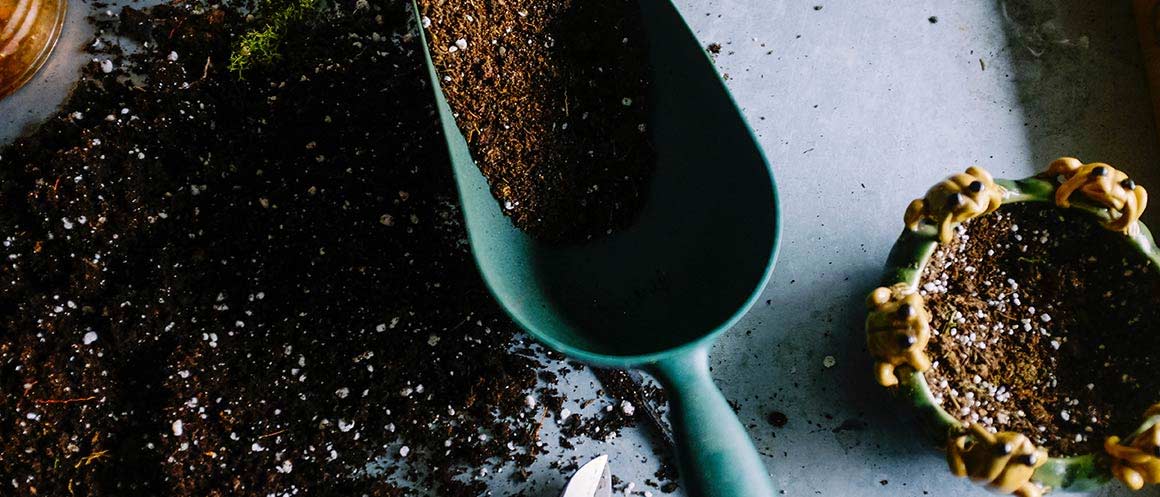
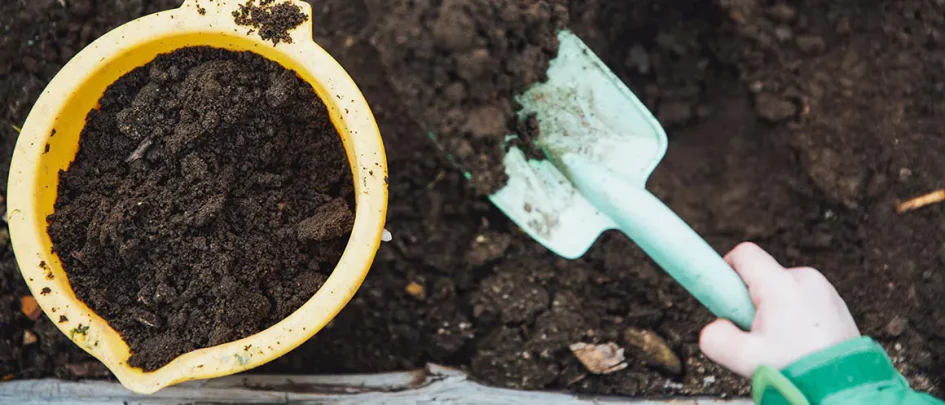
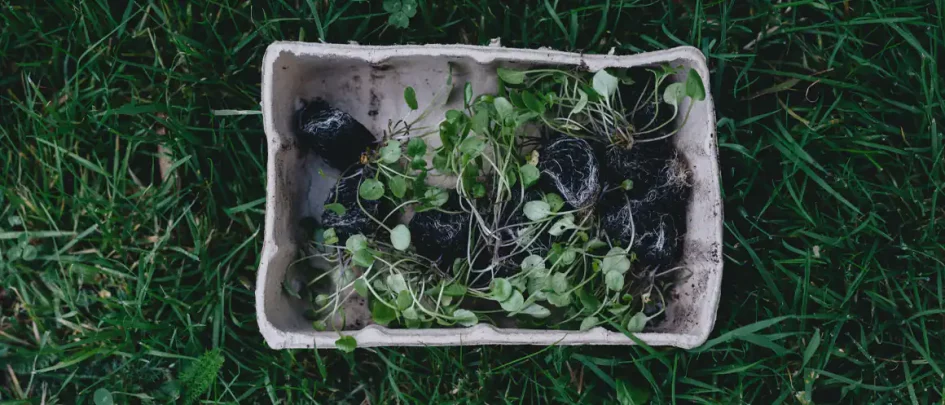
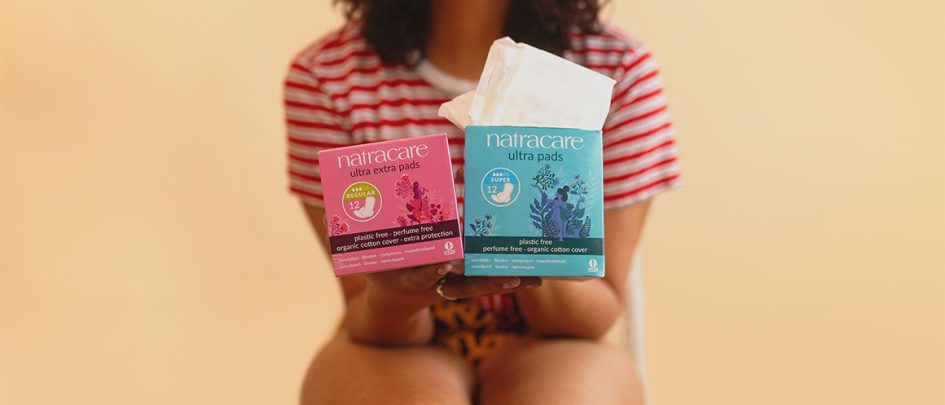






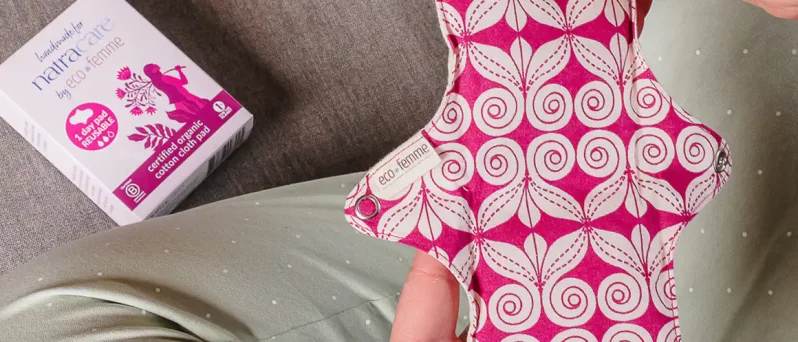

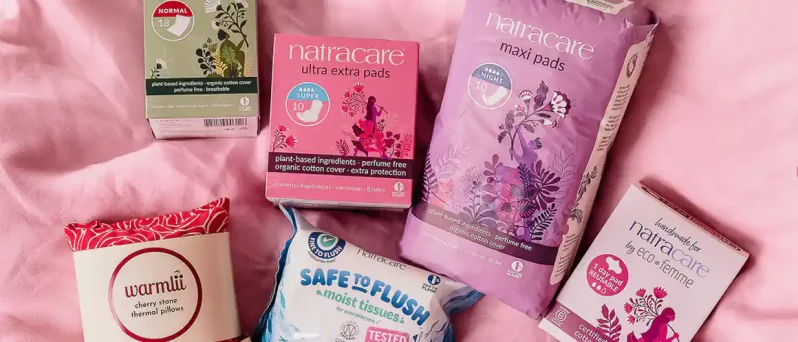
Have have you actually worked with a compost facility or backyard composter to get to these conclusions? Usually, when a product is tested for composting, the manufacturer has information on how long it takes to breakdown instead of vague reccomendations on how a standard compost pile works.
Are these considered a brown or a green? Have you even consulted with a compost professional to determine the feasibility of composting these products? have you done any kind of experimentation?
All Natracare products are considered compostable, and are classed as brown compost. Many of our pads and liners have passed testing for commercial composting standard EN 13432 and ASTM D6400. We also have testing data for home composting of Natracare pads and liners.
We know some Natracare users regularly compost our products and, some of them have done so for years! We recommend 12 months, but generally 18 months to be be safe. We’ve yet to hear about an unexpected surprise.
Hi,
I am so excited to know that this is an option! Can you confirm that this is for pads and tampons that I’ve used during my period? I thought you couldn’t compost bio-waste. Thanks!
Hi Gina, all natracare products are home compostable – so yes, both pads and tampons included! For bio-waste, composting needs a little longer before being used, we recommend at least 12 months, but 18 to 24 to really ensure everything has biodegraded properly and a well-sealed bin. Everything will break down properly and safely. When using a food-waste bin it’s best to check with your local authority first, they sometimes have stricter rules about what can and can’t be put in.
Really interested in your products, but keen to know if the tampon outer packaging is also plastic free?
Hi Clare,
Our applicator tampons have compostable packaging – cardboard and paper. Our non-applicator tampons are legally obliged to have plastic wrapping (which is widely recyclable) to ensure they are kept at a hygienic standard and hold the shape of the cotton before use. Natracare is plastic free by design and we only use plastic in our packaging where it is essential to do so.
Are these pads suitable to be put in the brown recycling bins?
In theory, yes Natracare products are suitable for brown food waste bins. However, each local authority will have different rules – you’ll need to check with yours first to make sure.
Dear Natracare
I am slightly concerned by the advice you are giving. For items to be accepted in commercial composting systems, they must be accredited to BS EN 13432 or an equivalent standard and in actuality most local authorities do not allow compostable packaging or any other accredited items into schemes not least because it is not possible to identify which items are compostable from visual inspection
Hi Mark, thanks for your message.
We’re currently certifying our product range to ISO Standard for commercial composting EN 13432 (as of March 2021). We are also in talks with waste management authorities in the UK on how compostable films and bioplastics might have a system for being recognised, the system will change in future as these types of materials grow in use.
We recommend consumers contact their local authority before putting Natracare products in with brown waste as their are regional and national differences! Natracare products can be confidentially composted at home in the meantime.
Hi, just reading through your comments and I’m wondering if you have achieved ISO Standard for commercial composting EN 13432 and from which certification body was this? And for which products?
Hi Charlotte, all Natracare period pads and most Natracare panty liners have passed testing to EN 13432 and ASTM D6400. The status is specified on each individual products page if it’s commercially compostable. The testing agency is OWS. Please get in touch if you have any further questions!
Hello,
We collect enough green (nitrogen) and brown waste (carbon) to build hot compost piles using the Berkeley Composting Method. I’m aware of menses containing bacteria and after leaving the body, can act as a breeding ground for potential hazardous microbes. Is this something I need to be aware of to consider how we use humus in the garden?
Hi Cindi, hot composting methods are even better for composting Natracare products than traditional cold composting, as it can help break down any pathogens. I would recommend shredding/separating pads, liners and tampons first to increase the surface area in order to help everything break down.
Do I need to compost the products to avoid harm to the environment? Or can I dispose of them regularly in a regular bin as I would with my other period products and still avoid harming the environment? I live in a flat without any garden facilities and my apartment bins don’t have compost or food recycling options.
Hi May, composting is the most eco-friendly way to dispose of Natracare products at this time. As you don’t have access to compost, we recommend using a biodegradable bin bag and disposing as normal. Natracare pads and tampons will break down much quicker and much more safely than conventional periods products in landfill.
My local authority says ONLY food waste may be placed in the composting bin. What they class as clinical waste (such as incontinence pads and urinary catheter bags and tubes) can go in the general waste bin. As they officially don’t want dressings or blood catheters even in the general waste, I am left wondering how I’m to dispose of any period products whether they contain plastic or not! 🙁
I’ve tried a moon cup, it leaked, never gonna save the environment with the amount of pads I was getting through! I travel a lot and would often not be able to wash reusable pads or period proof underwear the same day.
I had to search for information on this, I’m sure plenty of women are as confused as I am. It seems like a big campaign is much needed to educate women on what it is we are supposed to be doing!!!
Hi Alex, that’s a great shame – each local authority has different rules on what they accept in biological or food waste bins. Some councils offer dedicated bins for nappies and incontinence pads (as they typically generate so much waste). Menstrual pads and tampons can be included in this kind of scheme where the waste is then incinerated. Much better to burn a pad like Natracare’s made without any plastic or synthetic materials.
Ideally the way waste is managed and collected needs a massive overhaul to cut out any confusion and prevent unnecessary landfill. The best method for disposal of Natracare products is composting at home at this time until commercial composting facilities can include non-food compostables.
Hello, can you compost or recycle the peel off strip on your liners too?
Hi Faye, the peel strip is home-compostable!
Hi, I’m very confused on how to recycle.
External package in paper recycle I suppose, what about the pads themselves (brown compostable?), the envelope of the single pad (compostable?) and the pill strip? Thanks
Hi Antonella, different countries and local authorities all have their own way of managing household waste. So there isn’t a one-fits-all answer we can give you. We’ll send you an email so we can dig in deeper to your particular situation!
What about the wrappers? Are they comparable or biodegradable? In backyard compost …?
Hi Ashley,
• Ultra pads – we use a chlorine-free paper wrapper, this is recyclable or home compostable.
• Ultra Extra pads – we use a biodegradable plant-starch film wrapper, this is industrial compostable.
Hi there,
Love your products. I just want to make sure can you compost the plastic wrap the pads come in and the bit that covers the adhesive on the wings? I like to wrap the used pads in these but am not sure if it will compost too.
Hi Sarah, thanks for your question. The paper used to cover any areas of glue is home compostable.
The plant-starch wrapper on some of our pads is industrial compostable only. It’s best to wrap any used pads in toilet paper if you’re composting at home.
Sooooo………I am sitting here considering natracare for myself and two daughters. Loving the idea that we can compost them . But what kind of composter would you recommend. I’m thinking taking them out to the compost on the allotment could be pretty grim …….I can imagine them being spread all over th place by visiting critters .
Looking forward to hearing from you .
Heidi
Hi Heidi. There are many ways to compost Natracare products or anything biodegradable for that matter. All methods are suitable from bin composting to worm composting. The difference is the time it takes for the compost pile to turn into good, healthy usable soil ready to use on your allotment. One of the faster methods would be hot-composting (2-4 weeks). But even a trench compost (in-ground) is suitable, you just have to be prepared to wait for longer (6 months-1 year).
Does Natracare products (or organic products in general) work well with Bokashi composting? I Bokashi compost at home and I want to see if this is also a suitable option. With this method, how long would it take as well?
Hi Raquel, thanks for your message. Yes, Natracare products can be used with Bokashi composting.
The Bokashi living website recommends: “you can use your bokashi composter to save lots of other items from the landfill; anything compostable in fact. Used tissues, dirty or wet paper (such as butchers paper, paper towel), cut flowers, and compostable plastics. These items will all break down (eventually) through the bokashi composting process although you may need to set up a three bin composting system if you are going to add lots of extra items to your bokashi bin.” You can find more info here: Best things for your Bokashi bucket
You can compost your own humanure, toilet paper, biodegradable diapers, Vomit, (if your sick) Meat & Bones, Food Scraps, Read Joseph Jenkins Humanure Handbook. These Dry humanure toilets use sawdust. you put a layer of sawdust in the bottom of the bucket then when you make your deposit weather its your poop urine or vomit cover it over with sawdust. biodegradable diapers and Menstrual pads take them to compost bin.
Hello, Thank you for making compostable products! I am so appreciative. I wanted to check if the piece of paper which you peel off of the adhesive is also compostable (the one that has “natracare” printed on it).
Thank you!
Rebecca
Hi Rebecca, yes the peel strip is home-compostable as well!
Thank you very much making biodegradable and compostable pads from cotton and natural cellulose. I was just wondering if the adhesive used in the pads and for the peel stripe is also compostable and if it can fully breakdown in home compost.
Hi Chirac, the glue is degradable – not biodegradable. The adhesive can degrade safely in composting systems as it is non-toxic and exists in such small quantities in our pads and liners. The composting studies we’ve done show Natracare is safe to micro-organisms and bacteria as it breaks down. So yes, the glue is safe for compost but not fully compostable.
Can adult pads for incontinence be recycled in the green bin? Do you put them in a plastic combustible bag or a paper bag?
Hey Barbara, thanks for your question! No pad can be recycled, including our incontinence pads, but they are biodegradable and compostable. They come in a cardboard box and are either wrapped in plant starch or paper (depending on which absorbency you choose). We hope this helps!